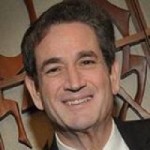By Rabbi Ben Kamin

ENCINITAS, California — The coming observance of Yom Ha-Shoah, Holocaust Remembrance Day, does not immediately bring to mind a global conflagration, nor the death camps, nor even the dreadful image of barbed wire. I first remember an old man.
As a child in Israel, I lived naturally and comfortably with survivors of the Holocaust—they were real, fleshy, tattooed, and sometimes emotional. Former inmates of Treblinka, Bergen-Belsen, and Auschwitz were often young parents in a new land, not yet jaded, that, by still being around, defied what the Nazis had intended. Some were elders, and they looked after one another, at least grateful for the freedom to think and reflect and even teach.
We children gained a sense of sanctity and survival from the numerous witnesses and sufferers that lived among us. They were moms and dads, bus drivers, ice cream vendors, mail men, and booksellers.
Indeed, Old Man Binstock, who owned the town bookstore in the village square, had survived Dachau. His gray shop, where we purchased our school texts and note pads, always had that dusty-sweet smell of old tomes and wisdom. Each time Binstock handed over a Hebrew book of geography or literature to one of us kids, he’d say under his breath: “Another scoop of dirt in Hitler’s grave.”
And then there was Mr. Steiner. He was more mysterious than the others; we never really knew where he lived or what he did for a career. But in the fall of 1961, as we youngsters resumed our studies, we noticed the tall and white-haired gentleman who met us every morning outside the schoolyard gate. He was kind and sweet, wounded somehow, yet smiling. We quickly learned that he enjoyed eating sunflower seeds.
It became a matter of pride for whichever one of us little boys provided Mr. Steiner with his daily bag of sunflower seeds. He was thankful for us in the morning and, as the wind blew in the scents of the nearby orange groves and onion fields, he would gently and ceremoniously tap each one of us on the top of our heads—and pronounce a mantra of his own. It is engraved in our memories, wherever we are today.
One can only imagine the legal and social implications of this daily visit and contact with a “stranger” anywhere in America over 50 years later. But in Israel in 1961, we were not afraid of a smiling older man who liked to chat with us young boys about autumn rain, soccer, and sunflower seeds.
Although he never directly mentioned the Holocaust, we understood that he had had something to do with it from two things: The tattooed numbers on his forearm and the phrase he regularly used when he, in fact, tapped our heads good-bye for the morning. Mr. Steiner would say, looking into our faces and placing his wrinkled hands on us:
“You’re not number six million and one.”
*
Rabbi Ben Kamin is a freelance writer and author based in Encinitas, California. He may be contacted via ben.kamin@sdjewishworld.com … San Diego Jewish World seeks sponsorships to be placed, as this notice is, just below articles that appear on our site. To inquire, call editor Donald H. Harrison at (619) 265-0808 or contact him via donald.harrison@sdjewishworld.com